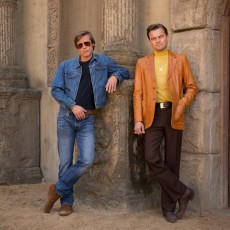『ワンス・アポン・ア・タイム・イン・ハリウッド』 来日記者会見/“Once Upon a Time in Hollywood” Japan Premiere Press Conference with Quentin Tarantino, Leonardo DiCaprio and Shannon McIntosh
NeoL / 2019年8月27日 20時0分
『ワンス・アポン・ア・タイム・イン・ハリウッド』 来日記者会見/“Once Upon a Time in Hollywood” Japan Premiere Press Conference with Quentin Tarantino, Leonardo DiCaprio and Shannon McIntosh
[caption id="attachment_86774" align="alignnone" width="620"]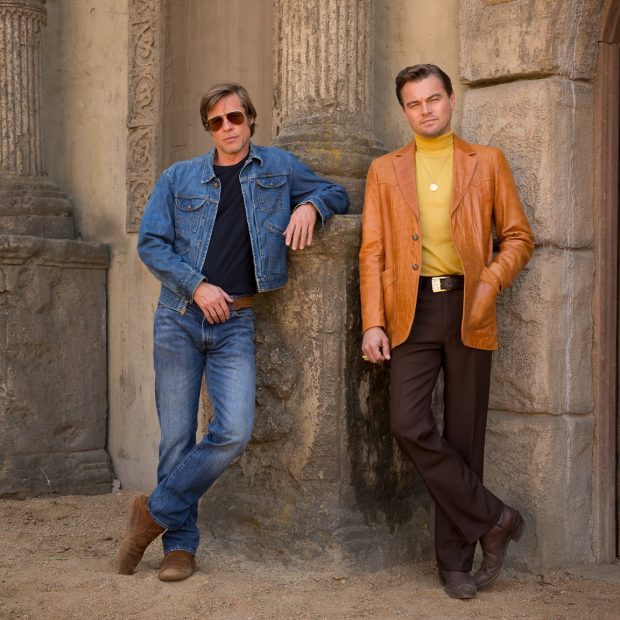
Brad Pitt and Leonardo DiCaprio star in Columbia Pictures ÒOnce Upon a Time in Hollywood"[/caption]
クエンティン・タランティーノ監督の通算9作目の映画『ワンス・アポン・ア・タイム・イン・ハリウッド』が8月30日に全国公開される。主演にレオナルド・ディカプリオとブラッド・ピットを迎えた本作は7月に全米公開され、タランティーノのキャリア史上最高のオープニング成績を記録した。舞台は1969年のハリウッド。主人公のリック・ダルトンはかつてテレビの西部劇で活躍した俳優だが、すでに人気のピークは過ぎ、自身の役者生命に不安を抱えていた。リックを支えるクリフ・ブースは付き人兼スタントマンで、2人は親友でもある。そしてリックの家の隣には、時代の寵児ロマン・ポランスキー監督と彼の妻で女優のシャロン・テートが引っ越してきた…。
映画は目まぐるしく変わっていくハリウッドの過渡期を、架空のキャラクターであるリックとクリフを主軸に描き出し、1969年に発生したシャロン・テート殺人事件という史実を交えながら展開していく。脚本執筆に5年の歳月を費やしたというタランティーノの映画愛が、そこかしこに詰め込まれた作品だ。主演の2人はもちろん、マーゴット・ロビー、アル・パチーノ、ダコタ・ファニングや、今年3月に逝去したルーク・ペリーら、豪華キャストが顔をそろえた。ここでは映画の公開を前に来日したタランティーノ監督、レオナルド・ディカプリオ、そしてプロデューサーのシャノン・マッキントッシュが出席した記者会見の模様をお届けする。(→ in English)
――まずお聞きしたいのですが、もうすぐパパになるそうですね?
クエンティン・タランティーノ監督「イエス!僕が妊娠しているわけではないけど、妻がね。多分家じゅうに小さなタラちゃんがたくさんいるような日も近いと思います」
――おめでとうございます!
タランティーノ監督「ありがとう!」
――1969年に発生したシャロン・テート殺人事件という史実に基づきながらも、リック・ダルトンとクリフ・ブースという架空の人物を加えるという本作のアイデアはどこから生まれたのでしょうか?
タランティーノ監督「本作では、ハリウッドにおいてカウンターカルチャーの変化が見られた時代を描こうと思いました。それはハリウッドという街だけでなく、業界自体が変化した時期です。その時期をシャロン・テートの殺人事件に至るまでの時間軸で描き出せば、歴史的な部分も掘り下げられて面白いのではないかと思いました。僕は13、4歳だった70年代にE.L. ドクトロウの『ラグタイム』という変わった小説を読みました。架空の登場人物と実在の著名人を組み合わせた物語で、イヴリン・ネズビットやハリー・フーディーニ、J.P.モルガンらが登場します。それをかねてから面白いと思っていたので、実際にハリウッドのあの時代を描こうと決めたときに、架空の登場人物を作って、そこに当時ロサンゼルス郡で暮らしていた人たちを加えようと思いました。だから、当時ロサンゼルス郡に住んでいた人の誰もが僕の物語に登場する資格があります(笑)」
[caption id="attachment_86776" align="alignnone" width="1485"]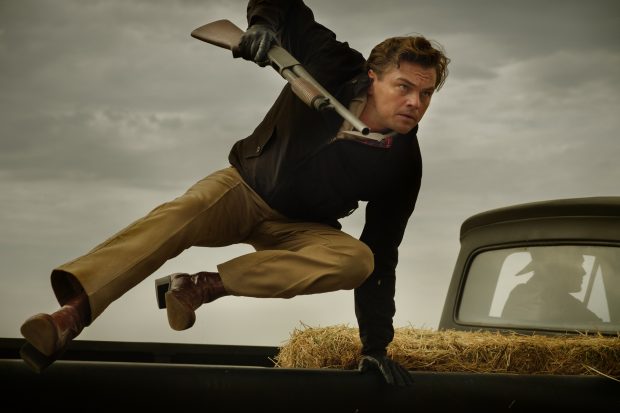
2488029 - ONCE UPON A TIME IN HOLLYWOOD[/caption]
――レオナルド・ディカプリオさんにお聞きします。2012年の『ジャンゴ 繋がれざる者』以来となるタランティーノ監督作品へのご出演ですが、オファーされたときのお気持ちをお聞かせください。
レオナルド・ディカプリオ「ジャンゴと比較するわけではないですが、本作ではクエンティンと一緒にリック・ダルトンという人物の魂の部分を作り上げられたことが非常に面白かったです。リックは物語に描かれた数日間でとても大きな変化を遂げるのですが、僕らはそれがどのような変化だったのだろうと話し合いました。私的な意味での変化にとどまらず、リックは役者としてなんとか時代についていこうと自分を駆り立てていたのです。1950年代のテレビの西部劇で活躍していた役者にとって、人気のある主人公ではなく悪役を演じるというアイデアは受け入れるに耐え難いことでした。でも彼の周りでは、文化も世界も演技そのものも変化していたわけです。
クエンティンはリックとクリフという2人のキャラクターを非常に美しい形で設定しました。ハリウッドの外れにいる彼らは、一枚のコインの表裏のような関係です。そして、リックは若い女の子に背中を押されて、自分では気づかなかった才能を発揮していきます。露骨にしすぎることなく、2日間に起きるリックの大きな変化を描き出すまでのクエンティンとの旅は、本当に素晴らしいものでした。また、クエンティンが僕ら2人のキャラクターの生い立ちを教えてくれたことも非常に役立ちました。一緒にこの2日間を描くにあたって、僕とブラッドにはリックとクリフの歴史が与えられたのです。それがあったおかげで、いろんなことを試す自由も与えられました。僕とブラッドを代表して言いますが、それは役作りの上でものすごく重要なものでした」
――リック役とクリフ役に、それぞれレオナルド・ディカプリオさんとブラッド・ピットさんをキャスティングした理由を教えてください。
タランティーノ監督「2人がこの役にぴったりだったからです。よく皆さんから『なぜレオとブラッドを選んだのですか?』と聞かれるのですが、自分が選んだというよりも、彼らが僕を選んでくれたのだと思います(笑)。すべての企画をオファーされる2人ですから、彼らには選択権があるわけです。僕はラッキーなことに、それぞれと過去に仕事をしたことがあり、作品を気に入ってもらえました。きっと山積みになった脚本の上の方に僕の脚本があったのだと思います。ラッキーなことに2人とも読んでくれて、内容やキャラクターに反応してくれました。控えめに言ってもこの10年で最高のキャスティングだと思っています。僕は本当に幸運です。すべては彼らがこの企画に反応してくれたおかげなのです。
一つ加えるとすれば、リックは主演俳優でクリフは彼のスタントダブルという設定ですので、演技が上手いからとか、有名だからというだけでキャスティングするというわけにはいきません。内面がどれだけ違ったとしても、外見的には似ている必要があるわけです。一人はカメラの前でもう一人のスタントダブルになるわけですから、同じ衣装を着たときに似ていなければなりません。その資質をこの2人が持っていてくれたのは、僕にとって本当に幸運なことでした」
[caption id="attachment_86777" align="alignnone" width="1485"]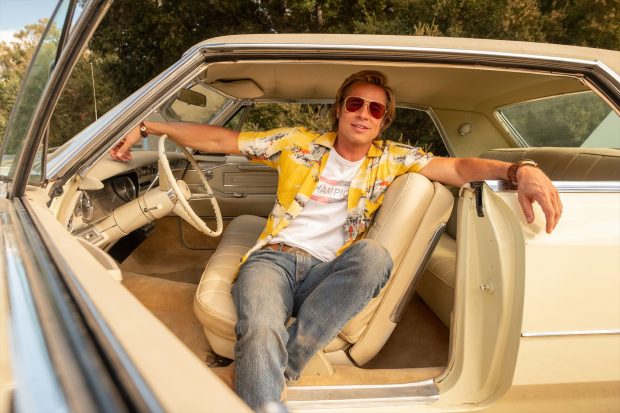
QT9_67895.raf[/caption]
――本作ではブラッド・ピットさんと初共演しています。劇中の2人は親友のように親しい関係ですが、どのように役作りをしましたか?
ディカプリオ「今回はまれなケースだと思います。これまでの作品でも、僕はできる限りのリサーチを行ってきました。本作のリックとクリフはこの業界で本質的につながっていて、変化していくハリウッドを外側から見つめています。あまり仕事が来なくなった自分たちにとって、居場所ではなくなってしまったハリウッドです。ブラッドと僕には輝かしいキャリアがあるかもしれないですが、僕らにも彼らのような経験はありますし、LAがどんな場所かもわかっています。長年にわたってこの環境に身を置いてきた僕らにとって、これは自然に演じられる役でした。僕らには2人のソウルや、常に拒絶されがちなこの業界を生き残る上での相互依存も理解できました。
また、クエンティンは僕らの歴史をつづった素晴らしい原稿も提供してくれて、リックとクリフが一緒に出演した作品のリストなどが書かれていました。そういった作業はすべてクエンティンがやっておいてくれたので、少し現場で慣らしたら、すぐに彼らのことが理解できました。撮影していく中でさらなる発見もありましたが、彼らの魂の部分は最初からわかっていたのです。それは僕らの時代精神やこの業界の置かれた環境に存在するもので、僕らは彼らのような人たちを知っていました」
――リック・ダルトンのインスピレーションとなった作品やキャラクターはありますか?
タランティーノ監督「すごく良い質問ですね。まず理解していただきたいのは、50年代のアメリカではテレビが登場して、それまでにいなかったようなタイプのスターが生まれたということです。それまでは映画か舞台かラジオのスターでしたが、テレビのスターが誕生しました。番組の一つのエピソードの視聴者数が、クラーク・ゲーブル主演の映画の観客数よりも多かったのです。ただ、この新しいタイプのスターたちが、50年代から60年代の過渡期にどうなるのかという答えはまだ出ていませんでした。
もちろん、テレビから映画へと見事に活躍の場を広げることに成功した3人の役者は、誰にでも思い浮かぶと思います。スティーブ・マックイーン、クリント・イーストウッド、ジェームズ・ガーナーです。でも、テレビから映画へと転向できる可能性がありながらも、うまくいかなかった役者たちもいたのです。作品のせいだった場合もあるし、ただラッキーではなかった場合もあるし、それはキャリアにおける予想のつかないことです。リックはそういった役者たちをベースに描かれています。一人の役者をインスピレーションにしたのではなく、いろんな役者の経歴を少しずつ取り入れました。その中には『ルート66』で主演したジョージ・マハリス、『サンセット77』で主演したエド・バーンズ、『ブロンコ』で主演したタイ・ハーディン、『ベン・ケイシー』で主演したヴィンス・エドワーズがいます。こういった役者たちの経歴を合成したのがリックなのです」
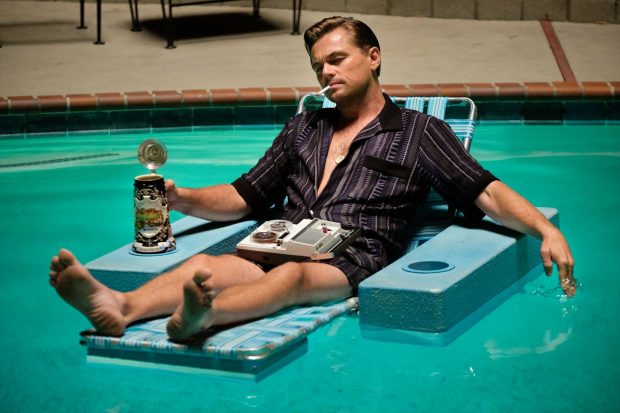
――リックを演じる上で一番大切にしたことは何ですか?
ディカプリオ「映画の仕事の素晴らしいところは、未知の世界に足を踏み入れられることです。熱狂的な映画ファンであるクエンティンは、僕がこれまでに知らなかった多くの役者を教えてくれました。作品を観たこともなかった人たちなのですが、リサーチを進めるにつれて、この業界や僕らの大好きな映画や仕事に貢献したのにもかかわらず、歴史的に忘れ去られた人たちを祝福するための映画なのだと気づきました。それは素晴らしい旅となりました。リックは自身の役者生命について悩む中で、自分が時代に忘れられて、カルチャーも変化していることに気づきながらも、ハリウッドという魔法のような世界の一部として仕事ができることに感謝するべきだと考えるようになるのです」
――シャノンさんは長年一緒に仕事をしてきて、タランティーノ監督ならではの撮影の進め方で印象に残ったことはありますか?
マッキントッシュ「クエンティンとの映画作りはマジカルで、現場も素晴らしく、まるでファミリーのような雰囲気です。一作目の『レザボア・ドッグス』からクエンティンと仕事をしてきたクルーもいて、みんな喜んで現場に戻ってきます。彼らは一緒に仕事をするのが大好きで、監督のビジョンを実現しようとしてくれますし、クエンティンに刺激されるので毎日現場に行くのが楽しいのです。撮影の合間にはクエンティンが映画史のレッスンをしてくれるんですよ。彼ほど映画に詳しい人は少ないですからね。本当にマジカルな現場なので、クエンティンのスタッフは彼が脚本を書き始めたと聞きつけたら『いつ撮影するの?』と連絡してきます。他の映画の仕事を辞めてでも参加したいわけです。そのような現場を見られることは本当にうれしいですし、本作ではクエンティンがレオやブラッドやマーゴットとのコラボレーションを通して、作品に命を吹き込むまでを目撃できてうれしかったです。クエンティンは毎回テイクを撮った後、『今のよかったけど、もう一度やろう』と言うんです。そこでクルーが『どうして?』と言い、最後は全員で『だって僕らは映画作りが大好きだから!』と言うのがお決まりになっています。それが現場のモットーなのです」
――劇中ではものすごい奇跡が起こりますが、皆さんの身の回りで起こった奇跡はありますか?
タランティーノ監督「映画監督としてキャリアを築き、9本も作品を撮り、日本の人にまで知られていること!1996年の僕はビデオ屋の店員で、最低賃金で働いていたわけですから(笑)。自分がプロとして仕事をしているだけでも奇跡ですが、こんなにも素晴らしい機会をいただいて、アーティストとして生きることが難しい業界においてアーティストでいられること。そして、仕事やお金のためでなく、自らの旅の次なる一歩として活動できること。それは間違いなく奇跡ですし、たくさんの機会に恵まれた自分はとても幸運であり、そのことを決して忘れないことが重要だと思います」
ディカプリオ「僕もクエンティンに完全に同意します。僕はロサンゼルス育ちで、実はハリウッドで生まれたので、この業界に限らず(この街でやっていくことが)どれだけ大変なのか本質的にわかっています。メッカのような、このハリウッドという夢の国のような場所に、世界中からたくさんの人がやってくるのです。僕だって放課後にオーディションに行かれるような距離に住んでいなければ、今日ここにはいなかったと思います。役者を仕事にできるだけでなく、クエンティンが言ったように、自分で役を決め、自分の選択で自らの運命をコントロールできる役者でいられることは、紛れもない奇跡です。僕は人生を通してそのことに対する感謝を忘れたことはありません。成功した役者であること自体が奇跡なのだと理解している人たちと仕事をしたいと思っています。僕らと同じ仕事をしている99%の人たちは、この立場にいないわけですから」
マッキントッシュ「レオとクエンティンの言ったことを繰り返すようですが、私も自分が大好きな仕事でキャリアを築けて、とても恵まれていると思っています。大好きな人たちと仕事ができて、毎日楽しく現場に行くことができて幸せです。それに応援してくれる家族がいることも。私にはこの業界のスケジュールに寛容な夫と、すくすくと育っている2人の素晴らしい息子がいます。これはかなりの奇跡です」
[caption id="attachment_86778" align="alignnone" width="1485"]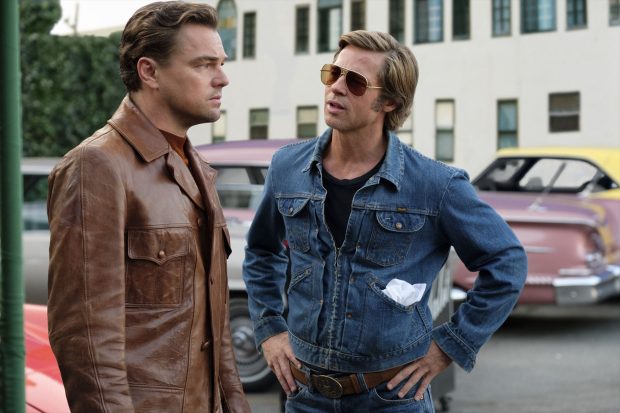
2488029 - ONCE UPON A TIME IN HOLLYWOOD[/caption]
――タランティーノ監督に質問です。1969年のハリウッドを作り上げる上で一番楽しかったことは何ですか?
タランティーノ監督「本作の製作はとても楽しかったので、たくさんあります。素晴らしいキャストとシーンやキャラクターを実現して行くのはものすごく楽しかったですし、とても満足しています。でも、特別な達成感を得られたのは、ロサンゼルスのような生きた街を舞台に時計を40年ほど巻き戻したことです。CGやスタジオ、セットなどを使うことなく、ビジネスが行われ、車や人が行き交う、まさに生きている街で成し遂げました。美術のデザインや映画で使用される様々なトリックを駆使して実現できたと自負していますし、マジカルな満足感があります。
ところで1969年と言えば、お話ししたいことがあるのですが、最近これまで知らなかった日本人の映画監督を発見しました。彼はクラハラ(蔵原惟繕)という名前で、57年か58年に制作された『俺は待ってるぜ』(1958)という作品を観て圧倒されました。すごい監督だなと思って他の作品を調べたら、1969年に日本国内で最もヒットした映画を制作していたことがわかったのです。『栄光への5000キロ』というタイトルで、カーレースについての映画みたいです。面白そうなのですが、どなたかご存知ですか? 僕はあと2日ほど滞在するので、英語の字幕付きのDVDを持っている人がいたらください。何か僕にプレゼントしたいと思っているあなた、僕は『栄光への5000キロ』が欲しいです(笑)」
――あなたにとってハリウッドはどんな存在ですか?ハリウッドが意味することは?
タランティーノ監督「僕もレオもよく話すのですが、ハリウッドには2つの意味があります。業界としてのハリウッドと、街としてのハリウッドです。この映画はその両方を掘り下げています。業界の街としてのハリウッド、そして市民が暮らすハリウッドを描いているのです。この街では大きな成功と中くらいの成功と中くらいの失敗と大きな失敗が隣り合わせです。時が経つにつれてそのポジションは変わっていくわけですが、僕にとっては魅力的なことなのです。ハリウッドで2、30年活動していると、まるで同じ高校に2、30年通っているような気分です。見慣れた顔が多くて、10年前からの知り合いもいて、嫌いになったわけではないけれど毎週遊ぶような仲でもない。でも会えてうれしいとは思うのです。それはまるで4年間の高校生活と同じで、ただそれを25年続けているようなものです(笑)。君はどう思う?」
ディカプリオ「僕もそう思うよ」
――あなたにとってのハリウッドとは?
ディカプリオ「僕はLAが地元なのですごく偏ってしまうけれど、ハリウッドは世界中でいわれのない避難を受けているように思います。もちろん、すごく嘘っぽい嫌な奴らも住み着いてはいますが、僕自身はロサンゼルスで育って、家族や友人たちと素晴らしい人間関係を築いてきました。ロサンゼルスは夢の工場ですから、それによってたくさんの成功や失敗が生まれます。でも、僕は人生を通してLA出身の家族がいることをとても誇りに思っています。それに、ロサンゼルスで新たに出会った素晴らしい人たちもいます。世界中からやってきた、主に政治的な意見の合う人たちと交流してきました。LAは僕がいつでも帰りたいと思う場所なのです」
マッキントッシュ「レオやクエンティンと違って、私はロサンゼルス育ちではないのですが、もう20年も暮らしています。ロサンゼルスで仕事をしながら家庭を持つことができて光栄です。今や私の大切なホームです。大好きな街です」
text Nao Machida
『ワンス・アポン・ア・タイム・イン・ハリウッド』
8月30日(金) 全国ロードショー http://www.onceinhollywood.jp/
<ストーリー>
リック・ダルトン(レオナルド・ディカプリオ)は人気のピークを過ぎたTV俳優。映画スター転身の道を目指し焦る日々が続いていた。そんなリックを支えるクリフ・ブース(ブラッド・ピット)は彼に雇われた付き人でスタントマン、そして親友でもある。目まぐるしく変化するエンタテインメント業界で生き抜くことに精神をすり減らしているリックとは対照的に、いつも自分らしさを失わないクリフ。パーフェクトな友情で結ばれた二人だったが、時代は大きな転換期を迎えようとしていた。
そんなある日、リックの隣に時代の寵児ロマン・ポランスキー監督と新進の女優シャロン・テート(マーゴット・ロビー)夫妻が越してくる。今まさに最高の輝きを放つ二人。この明暗こそハリウッド。リックは再び俳優としての光明を求め、
イタリアでマカロニ・ウエスタン映画に出演する決意をするが―。
そして、1969年8月9日-それぞれの人生を巻き込み映画史を塗り替える【事件】は起こる。
公式Twitter:https://twitter.com/SPEeiga
公式Facebook:https://www.facebook.com/SPEeiga/
2019年/アメリカ映画/原題:ONCE UPON A TIME... IN HOLLYWOOD 本編上映時間:2時間41分 PG12 字幕翻訳:松浦美奈
全米公開 7月26日公開
(This interview is available in English)
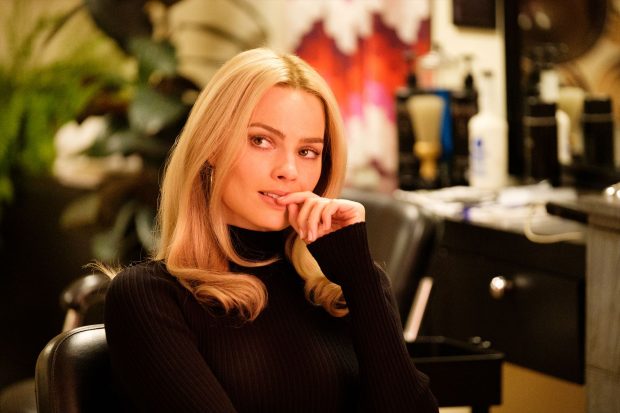
[caption id="attachment_86774" align="alignnone" width="990"]
Brad Pitt and Leonardo DiCaprio star in Columbia Pictures ÒOnce Upon a Time in Hollywood"[/caption]
――First of all, we have heard that you will be a dad soon.
Quentin Tarantino: Yes! Well, I'm not expecting but my wife is. I think there will be a house full of little Tara-chan coming up in one of these moments.
――Congratulations!
QT: Thank you!
――How did you come up with the idea of mixing a historical event with fictional characters?
QT: It was interesting. I decided to explore that time in Hollywood where a counter culture change was happening, and when I say Hollywood, I mean both the town and the industry. And I thought that was a very interesting thing. And the whole Sharon Tate leading up to the murders, I thought, put it in a very interesting time historical perspective.
And in the 70's, there was a novel by E. L. Doctorow called "Ragtime." It was a weird kind of book for me to read, but I remember reading that when I was 13 or 14 years old. It took that time period and took a bunch of fictional characters, and mixing it with luminaries from that time period whether it’d be Evelyn Nesbit or Harry Houdini or J.P. Morgan. And I always thought that was kind of an interesting idea, so when I decided to actually look at that period of Hollywood, I thought, let me make it up of my fictional characters and then basically other people who lived in Los Angeles County at that time. If you lived in Los Angeles County at that time, you are eligible to be in my story [laughs.]
[caption id="attachment_86776" align="alignnone" width="1485"]
2488029 - ONCE UPON A TIME IN HOLLYWOOD[/caption]
――This is the first time you work with Mr. Tarantino since “Django Unchained.” How did you feel when you first got the offer?
Leonardo DiCaprio: What was incredibly interesting about this character I would say, not oppose to the experience of Django, was getting to collaborate with Quentin on who the soul of the man was. I think that in a lot of ways, Rick is a template. This whole story is set within a couple days, and he goes to this massive sort of transformation, and we were kind of discussing what that transformation was. It's not only a personal one. It's him pushing himself to be a modern actor in a lot of ways. Coming from 1950's sort of television cowboy world, the idea of playing an anti-hero and not being a likable lead is something that he can't even contemplate. Here, we have this man that is going through this massive personal transformation, but the culture is changing and the world is changing, acting is changing.
And I just thought it was incredibly beautiful the way he set these two characters up. Two guys that were interconnected, that were sort of two sides of the same coin that were on the outskirts of Hollywood, but then, the idea of this young girl that sort of pushes him to go beyond what he thinks he is capable of doing. And that journey with Quentin of trying to find this massive transformation within two days without making everything so obvious was an incredible one.
And what was so helpful was the fact that he gave us this entire backstory of both of our characters. So we had this history going into these two days together. That sort of freed us up to take a lot of chances, I can speak for Brad and myself, and it was incredibly important in the transit in making these characters.
――Why did you cast Leo and Brad Pitt for Rick Dalton and Cliff Booth?
QT: Well, they were perfect for their characters. People have been asking me "how did you choose Leo and Brad?" And frankly, it’s more that they chose me [laughs.] They are offered everything, so they get to choose. And I'm lucky enough that I've worked with both of them and they liked my work. I think my script ended up towards the top of the pile, so I was lucky enough that they both read it and they responded to it and they responded to the characters. But I think it's the one of the cast and crews of the decade if not the generation. So I'm really lucky. But it's all these guys responding to the material.
But I would add one thing though. Since one guys is playing a lead actor and the other guy is playing his stunt double, you can't just cast any two actors no matter how good they are or how big they are. They have to work together. As different as they are as characters on the inside, physically they have to resemble each other. They have to look like each other when they wear the same outfits. One guy has to actually double for the other guy on camera. So you needed two actors that you could believe that one could actually double the other one. And so back to these two guys, they worked up, really fortunate for me.
[caption id="attachment_86777" align="alignnone" width="1485"]
QT9_67895.raf[/caption]
――This is your first time to co-star with Brad Pitt, and your relationship in the film is really close like best friends. How did you prepare for the role?
LD: I would say this is one of those rare scenarios. I think with every character that I've played I do as much research as I possibly can. But in Quentin's approach, not that this was on the road or these guys were beat at all, but they were on the outskirts. They were two guys that were intrinsically linked in this industry, on the outskirts looking into Hollywood as it’s changing, Hollywood they did not belong to that they aspired to be a part of as are struggling for work. And I think that Brad and I obviously had very successful careers, but we have been there, we know what LA is like. We have been in this environment for such a long period of time that it was such a natural fit. We understand the soul of who these men were, and the dependence they had on one another to survive in an industry like that filled with constant rejection.
Quentin also gave us this incredible manuscript of our history together, the films we had done together, the partnerships that we had. So a lot of that work was done for us, and the second we kind of warmed up on set, we knew who these guys were. We were going to find out more as the filming went on, but we knew who the soul of these people were, because it was in our zeitgeist, it was in our surroundings in this industry. We knew who these people were.

――Were there any films or characters that inspired the character of Rick Dalton?
QT: That's a really good question. You have to understand when television became big in America in the 50's, it created a different kind of star that never existed before. All the stars before then had been movie stars or theater stars or radio stars. But they created television stars. And in one episode of one TV show, a bigger audience could watch that show than had ever seen any one Clark Gable movie ever. So it created this whole breed of new type of star. And what was going to happen to those stars was a question that wasn't answered yet in the 50's leading into the 60's.
We all know the examples of the actors that were able to be successful on TV shows at that time and transition of becoming movie stars. In particularly, three of them that did it perfectly well were Steve McQueen, Clint Eastwood and James Garner. But the thing is there was a group of other actors that had the possibility of pulling off the TV to movie transition, but they just didn't work. Either the movies weren't that good or they weren't as lucky or all kinds of things, it's just vagaries of a career happen. And some of those actors are who I based Rick on. I didn't base him on one guy. I kind took a little bit of biography from this actor and a little bit of biography from that actor. And so some of those actors are people like George Maharis who was a star of "Route 66," Ed Burns who was a star of "77 Sunset Strip," Ty Hardin who was a star of "Bronco," Vince Edwards who was a star of "Ben Casey." In and around, that was kind of the idea of making Rick somewhat biographical composite of those guys without being one particular.
――What were you particular about playing Rick?
LD: What is so fascinating about being able to do movies in general is your entrance into the world that is unknown to you. And Quentin being this incredible cinephile introduced me to all these actors that I had never encountered before. Never looked at historically, never seen much of their work, maybe glimpse of pieces of their work, but that research in its own right was the realization for me, that this movie in a lot of ways is the celebration of our industry, those who have contributed to films and work that we love but may have been forgotten historically. It was an incredible journey for me to go on. And ultimately how that referred him to Rick as a character, I believe, is a man dealing with his own mortality realizing that maybe time has forgotten him, maybe the culture is moving, but he should be thankful for the fact that he's there and present and able to work in a part of this magical world we called Hollywood.
[caption id="attachment_86780" align="alignnone" width="1470"]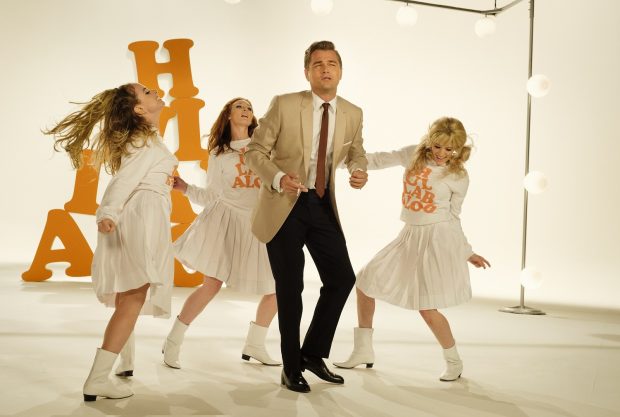
Leonardo DiCaprio star in Columbia Pictures メOnce Upon a Time in Hollywood"[/caption]
――You have been working with Mr. Tarantino for years. What do you think is special to work with him on set?
SM: Making a movie with Quentin is magical and the set is an amazing place to be. We have what we call family on set and there are many people who’ve worked with Quentin since his first movie "Reservoir Dogs," so the crew are always excited to get back together to work with him. It's an amazing group of people who really love to work together, who want to put his vision out there, and love to come to work everyday because he inspires us. And in between shots he's giving them film history lessons, so we always learn and write down what movies and TV shows we should go watch, because he knows more than most anyone on these subjects. But it's truly a magical time and when our crew hears that Quentin is writing, they begin to call and ask “when do you think it's going to go?” because they would quit any other movie to be on his sets. And it's truly a joy to be there and witness it, and also this particular movie was a joy to watch him collaborate with Leo and Brad and Margot and bringing this movie to life, so sheer joy, sheer pleasure, it's a magical place to be.
Also, we have a saying on set that happens after Quentin has gotten a take. He'll say, "we've got that, but we're going to do one more." And the crew goes "why?" and we all say, "because we love making movies!" And that's the motto that goes with this everywhere.
――So a miracle happens in this film, but are there any miracles that happened to you?
QT: It can be… me having a movie career and have been able to make nine movies, and I can go to Japan and you know who I am! Compare to 1996 when I was working for minimum wage at a video store [laughs.] To me, that's a miracle to some degree or another. Just me being a working professional would be a miracle, but to have just profound incredible opportunity that I've had to actually be an artist in the industry that it's actually difficult to live a life of an artist, where I'm not doing things because it's a job or I'm not doing things for money, I'm doing the next step on my journey. That's a miracle. That's an absolute miracle and I'm very fortunate and I have a lot of opportunity and it's just important to me that I never forget that.
LD: I would have to completely agree with Quentin's sentiment. Just in a sense that I grew up in Los Angeles, I was born in Hollywood, and I know intrinsically how hard it is not only in our industry, but people come from all over the world to this mecca, and this sort of dreamland that is Hollywood. And a lot of people aren't able to fulfill those dreams. And if I wasn’t able to go on auditions after school, I probably wouldn't be sitting here today. And the miracle of being able to be not only a working actor, but to be an actor, as Quentin said, that can control your own decisions and your own destiny by your choices is an absolute miracle. I have not wavered my appreciation for that through my entire life, and I like to work with those that also realize that they, by working in this industry, understand that being a successful actor is in its own right of miracle. And that is the truth 99% of people who do what we do don't get to be in this position so that would be my answer.
SM: I'll mimic a bit of what Leo and Quentin said, but I'm so blessed and fortunate to have a career and working profession that I love working in and to get to work with the people I love to work with and it's a joy to go to work everyday. And that I have a family at home that supports me and a husband who actually can put up with the hours that as in our industry, and that I have two wonderful boys who are growing up well. It's quite a miracle.
[caption id="attachment_86778" align="alignnone" width="1485"]
2488029 - ONCE UPON A TIME IN HOLLYWOOD[/caption]
――What was the best part of recreating Hollywood in 1969?
QT: It was a lot of fun to do this movie, so there was a lot of thing. I had such a fantastic cast so working with different actors and making these scenes come alive, or making these characters come alive was just tremendous amount of fun, and I'm just very gratified. But I guess when it comes to satisfaction, there is a special satisfaction because I had never really done it before of taking a living town like Los Angeles and turning back the clock 40 years, and not doing it with CGI, and not doing it on a sound stage, and not doing it on a back lot, but doing it on a living breathing town that has businesses and cars and people moving around. And like I said, not doing it with CGI, doing it through production design and film trickery and film sawdust and tinsel and pulling it off. I feel we did. And that's what's really incredibly gratifying to me. That's the magician part.
You know, actually, speaking of 1969, there is something I kind of want to bring up. I just discovered this Japanese director that I wasn't that familiar with. His name is Kurahara and I saw the first movie he ever did in '58 or '59 called "I'm Still Waiting" and I was blown away by it. I thought, “wow! This guys is terrific,” so I started looking up some of the other movies he did, and apparently he did a movie in 1969 that was the biggest movie in Japan that year. It's a racecar movie called "Safari 5000." It's like a grand-prix kind of movie. Have you guys every heard of it? It looks great. So anyway, anybody here in Japan who wants to give me a copy of "Safari 5000" in DVD with English language subtitles, I'm here for two more days. I'm here. I want it. So if you want to give me a gift, that's the gift I want. I want "Safari 5000" [laughs.]
――What is Hollywood to you? What does Hollywood mean to you?
QT: I think one of the things me and Leo have been saying for both of us is Hollywood has two meanings. There is the industry and there is the town. And this movie tries to deal with both of them. It tries to deal with an industry town what's going on, but also tries to deal with it as a town that has citizens or a town that has denizens. And a town where frankly great success and medium success and medium failure and great failure can be right next to each other. Those positions change as the years go on and to me that's kind of fascinating. If you are lucky enough to work in Hollywood for 20 or 30 years, it's like going to a high school for 20 or 30 years. Because you see a lot of the same people, and you might have actually been friends with this person 10 years ago and you still like them now, but you don't hang out with them everyday or every week. But you are still happy to see them, which is kind of how high school usually happens in four years, and now just stretch that out for 25 years. It's sort of what it's like [laughs.] Would you agree with that?
LD: I agree.
――What is Hollywood for you?
LD: Well, for me, like I said, you are speaking to an LA native so I'm incredibly biased. But I do think Hollywood in particular gets a bad rap around the world for, not to say that there aren't those incredibly superficial obnoxious people dwelling in my town, but I happened to be somebody that is forged the greatest relationships of my life, my family, my friends, growing up in Los Angeles. So like I said, it's this dream factory and that dream factory can lead to a lot of success or failure. But I'm just very proud to have LA natives in family members that I have known for my entire life there. I've met some of those fascinating people in my life in Los Angeles as well. People from all around the world that I've gotten to interact with and have mostly great politics [laughs.] But it's a place where I can go to and always happy to be back no matter where I am in.
SM: Unlike Leo and Quentin, I did not grow up in Los Angeles, but I've now lived there for 20 years. So I feel privileged to work there and to raise my family there and it is now home, and that's where my heart is. I love it.
関連記事のまとめはこちら
https://www.neol.jp/movie-2/
この記事に関連するニュース
-
「自分にとって何が大切なのかを知ることができた」Jamie xx “In Waves”インタビュー
NeoL / 2024年9月16日 17時0分
-
広報戦略ミス?...霞んでしまったメーガン妃とヘンリー王子のNetflix新番組「POLO」
ニューズウィーク日本版 / 2024年9月14日 10時10分
-
Message from Anna Umemiya: “I began treatment for breast cancer on July 31.”
OTONA SALONE / 2024年9月4日 16時30分
-
【ミスミ】機械部品調達のAIプラットフォーム「meviy」/ ハンドクレーン業界シェアNo.1のアイコクアルファがmeviyを採用
PR TIMES / 2024年8月30日 13時15分
-
IS:SUE discusses their group philosophy: "I’m ishu. I’m cool and amazing just the way I am"
Rolling Stone Japan / 2024年8月23日 12時0分
ランキング
-
1「ぜんたーい、止まれ!」その入場行進なんのため? 元体育主任が語る、運動会で廃止すべきこと3つ
オールアバウト / 2024年9月20日 20時35分
-
2メルカリで「マイナス評価」が1つでもあったら売れなくなる? 購入を敬遠される可能性も……
オールアバウト / 2024年9月20日 20時40分
-
3「SHOGUN」エミー賞受賞を喜ぶ人と抵抗ある人 日本人がアメリカで最多受賞した本当の理由
東洋経済オンライン / 2024年9月20日 13時0分
-
4「高齢者に炭水化物は毒」は大ウソである…長寿国では「パン、そば、うどん」をもりもり食べている事実
プレジデントオンライン / 2024年9月20日 15時15分
-
53COINSの高級ドライヤー、めちゃ軽くて手が疲れにくくていいけど……
女子SPA! / 2024年9月19日 15時45分
記事ミッション中・・・
記事にリアクションする
![]()
記事ミッション中・・・
記事にリアクションする

エラーが発生しました
ページを再読み込みして
ください



